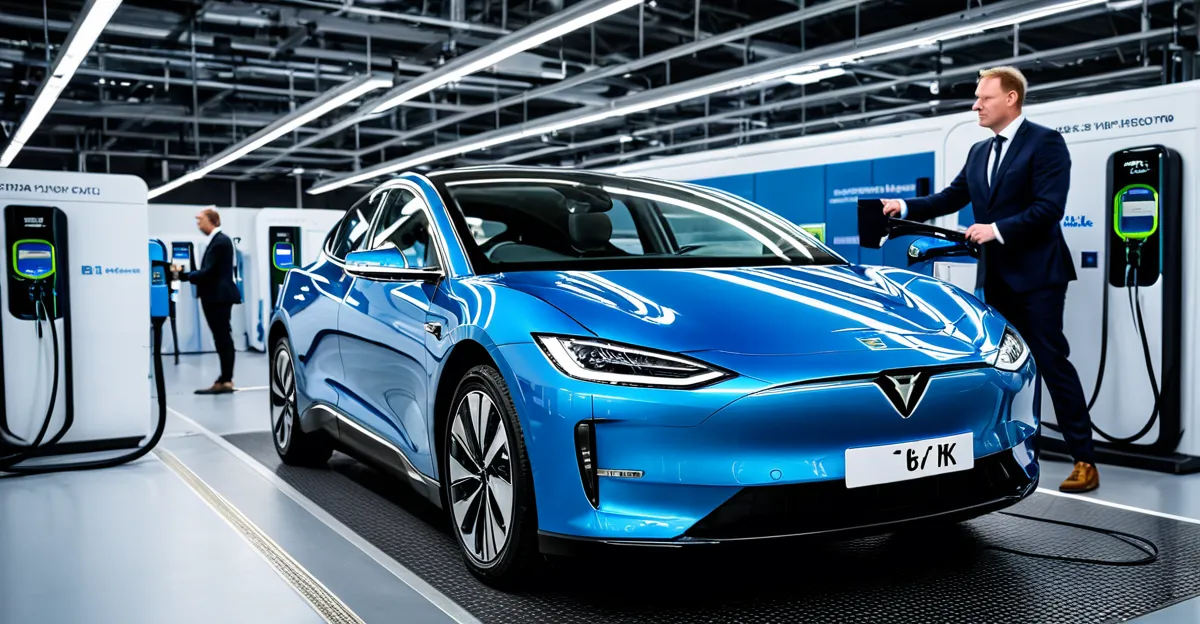Projected Growth of Electric Vehicles in the UK
The electric vehicle market UK is experiencing rapid expansion, with forecasts predicting substantial growth over the next decade. Analysts estimate that EV sales could represent over 50% of all new car sales in the UK by 2030, fueled by rising consumer interest and stricter emissions regulations. This sharp upward trend confirms positive EV adoption trends nationally.
Key drivers behind this growth include government policies promoting zero-emission vehicles, substantial investments in charging infrastructure, and increasing affordability of EVs as battery costs fall. These elements collectively accelerate the future of UK EV industry, positioning it as a global leader in sustainable transportation.
Additional reading : What Are the Trends Shaping the Future of the UK Automotive Industry?
Industry transition timelines suggest a gradual but decisive shift from internal combustion engine vehicles to fully electric fleets. By 2035, ICE vehicle sales are expected to cease, intensifying demand for EV technology and support services. This transition not only reshapes the automotive sector but also signals new opportunities and challenges across the UK’s economy related to vehicle production, maintenance, and energy supply.
Impact on Job Creation and Displacement
The electric vehicle market UK is reshaping employment landscapes, creating significant EV job opportunities while also leading to job displacement in certain areas. Sectors such as battery manufacturing, EV assembly, and charging infrastructure are seeing notable growth, generating new roles that require specialized skills. For example, the rise of battery production UK plants is driving demand for technicians, engineers, and supply chain experts focused on this emerging technology.
Also to see : What are the latest trends in UK car manufacturing innovation?
Conversely, traditional automotive roles tied to internal combustion engine (ICE) vehicles face decline. Manufacturing jobs related to engine assembly and exhaust system production are at risk, as the future of UK EV industry transitions to electric drivetrains. This shift necessitates workforce retraining to bridge skill gaps and reduce unemployment during the transition.
Case studies from regions with established automotive hubs highlight a mixed employment impact. While some areas report early job losses, others adapt by investing in training programs, aligning local talent pools with EV sector needs. Monitoring these EV adoption trends is vital for policymakers and businesses to balance growth and displacement effectively, ensuring a stable and inclusive job market as the industry evolves.
Key Industries Affected by Electric Vehicle Expansion
The electric vehicle market UK is profoundly transforming traditional automotive manufacturing jobs. Conventional vehicle assembly lines are adapting to produce electric drivetrains, reducing complexity in engine components but increasing demand for precise electrical and software expertise. This shift means workers skilled in mechanical assembly may face changes in role requirements or retraining.
Battery production UK is a critical growth area fueling the future of UK EV industry. The establishment of gigafactories requires an expanded engineering workforce specialized in chemical, electrical, and systems integration disciplines. These facilities are hubs for innovation, assembling battery cells at scale to meet increasing EV demand.
Alongside manufacturing, the EV supply chain undergoes a transformation. Suppliers of traditional engine parts are pivoting toward electric powertrain components, while new players specializing in battery materials and electronics emerge. This industry evolution highlights significant opportunities for workers with skills aligned to EV-specific technologies, and the importance of integrating supply chain flexibility with the rapid EV adoption trends the UK is experiencing.
Changing Workforce Skills Requirements
As the electric vehicle market UK expands, the demand for specialized skills for EV jobs intensifies. Workers now need proficiency in battery technology, electrical systems, and advanced software used in modern EVs. Unlike traditional mechanical roles, these positions require knowledge in diagnostics, power electronics, and digital control systems, reflecting the evolving EV maintenance skills essential for sustained industry growth.
To meet this need, green jobs training programs have been established across the UK, focusing on vocational education and reskilling existing automotive workers. Initiatives emphasize interdisciplinary learning that blends electrical engineering with environmental science, preparing the workforce for the future of UK EV industry.
Workforce retraining is crucial where job losses in ICE manufacturing occur. These programs aim to reduce displacement by equipping employees with relevant abilities to fill emerging roles in EV assembly, battery production, and software development. Continuous education frameworks and partnerships between industry and educational institutions are fostering an adaptable talent pipeline, ensuring the UK’s EV sector remains competitive as EV adoption trends accelerate.
Policy, Investment, and Industry Reactions
The government EV policy UK plays a pivotal role in shaping the electric vehicle market UK, directly influencing EV job opportunities and industry growth. Key initiatives include grants for EV buyers, subsidies for charging infrastructure installation, and regulations phasing out internal combustion engines. These policies encourage consumer uptake, fueling positive EV adoption trends that strengthen the future of UK EV industry.
Public and private investment commitments complement this framework. Significant funding targets gigafactory development, battery research, and expansion of charging networks, creating a robust ecosystem. Industry players respond with strategies emphasizing workforce retraining and recruitment, aligning with evolving needs.
These coordinated efforts mitigate job losses in traditional automotive sectors by promoting new roles in EV sector, particularly in technology, manufacturing, and infrastructure. By integrating policy incentives with investment, the UK fosters a resilient EV supply chain and engineering workforce.
Ultimately, this synergy between government EV policy UK, industry investment, and workforce adaptation accelerates the transition. It ensures the UK remains competitive while balancing employment impacts, supporting sustainable growth across the evolving EV landscape.
Expert Insights and Employment Data
Industry experts consistently highlight the transformational impact of the electric vehicle market UK on employment, emphasizing positive EV employment data UK trends. Recent analyses show increasing numbers of EV job opportunities emerging in battery production, software development, and charging infrastructure installation. These roles often require advanced technical skills, supporting the call for enhanced skills for EV jobs to sustain growth.
Case studies from regions like the Midlands and North East reveal how targeted investments and workforce retraining programs foster economic resilience during the EV transition. Experts recommend continued emphasis on vocational training and public-private partnerships to smooth the shift and avoid prolonged job losses in legacy automotive sectors.
Forecasts predict net job growth as expanding gigafactories and EV supply chains create diverse roles, though the pace varies by region depending on industrial adaptation. The consensus urges policymakers and businesses to monitor EV transition case studies closely, drawing lessons to balance employment gains with necessary displacement mitigation.
Ultimately, aligning the future of UK EV industry with workforce capabilities is crucial for maximizing opportunities and overcoming challenges in this rapidly evolving electric vehicle market UK landscape.










